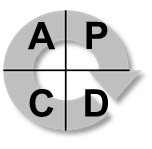SPIF Tip #15: If Nothing is Improving, You’re Probably Not Doing THIS Right
 When Edwards
When Edwards
Managers who fail to ask how their people are achieving the results miss an opportunity to learn what works, as well as what doesn’t. They also miss an opportunity to ensure the people on their team know these things.
Such errors of omission prevent companies from creating lasting improvement. PDCA provides the most practical management framework for achieving and sustaining improvement. And like riding a bicycle, it can only be learned by doing. It cannot be learned academically, by attending seminars or reading a book like this one. You have to do it to understand it.
As Deming intended, PDCA embodies the scientific method applied to business processes. Broadly, the scientific method of process improvement entails:
- Recording observations (made possible by operating definitions and measurement)
- Identifying causality (through cause and effect analysis)
- Positing hypotheses (for improving work and results, and minimizing variation and waste)
- Experimenting (to test hypotheses regarding causes, effects and solutions)
- Continuing observation (to verify that gains are locked in and sustained)
PDCA constitutes a rational, data-driven framework for managing work. It respects the intelligence, skills, and dedication of marketing, sales, and service people, as well as customers. It can be scaled from managing what happens between a salesperson’s ears as he calls on customers to managing the largest, most complex enterprises. Like process methods in general, it promotes a common language, agreed-upon objectives and measures, and a common approach (method) to achieving improvement.
As a discipline, PDCA traces the lines of reasoning so as to transcend people’s opinions about what worked at their last company or at a competitor, as well as the often optimistic claims of sales training and software vendors. It gives management at all levels unprecedented visibility into the sales process and positions them to ask powerful questions — reason enough for management to adopt PDCA. It also gives marketing, sales, and service workers useful tools for understanding what they should change and how to go about changing it.
Action Item:
For any production activity – like regular sales meetings, for example – consider establishing a regular agenda designed after this model:
- Check the current situation for learning
- Act, or adjust from what you have learned
- Plan the new objectives, methods, and measures
Excerpt from Sales Process Excellence

